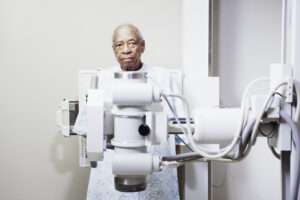Cancer is a disease in which cells in the body grow out of control. When cancer starts in the prostate, it is called prostate cancer1 . Except for skin cancer, prostate cancer is the most common cancer in American men.
The CDC2 states that 176,450 men in the United States were diagnosed with prostate cancer in 2013 and 27,681 men died from prostate cancer. It gets worse for Black Men. African-American men are nearly 1.63 times more likely to be diagnosed with prostate cancer than Caucasian men and 2.4 times more likely to die from the disease. Jay Harold wants you to know more about this deadly disease that affects Black Men at a higher rate than other men.
What Is the Prostate?
The prostate is a part of the male reproductive system, which includes the penis, prostate, and testicles. The prostate is located just below the bladder and in front of the rectum. It is about the size of a walnut and surrounds the urethra (the tube that empties urine from the bladder). It produces fluid that makes up a part of semen.
As a man ages, the prostate tends to increase in size. This can cause the urethra to narrow and decrease urine flow. This is called benign prostatic hyperplasia, and it is not the same as prostate cancer. Men may also have other prostate changes that are not cancer4 .
What Are Prostate Cancer Risk Factors?
Research has found risk factors that increase your chances of getting prostate cancer. These risk factors include—
- Age: The older a man is, the greater his risk of getting prostate cancer.
- Family history: Certain genes (passed from parent to child) that you inherited from your parents may affect your prostate cancer risk. Currently, no single gene is sure to raise or lower your risk of getting prostate cancer. However, a man with a father, brother, or son who has had prostate cancer is two to three times more likely to develop the disease himself.
- Race: Prostate cancer is more common in African-American men. It tends to start at younger ages and grow faster than in other racial or ethnic groups, but medical experts do not know why.
Researchers are trying to determine the causes of prostate cancer and whether it can be prevented. They do not yet agree on the factors that can influence a man’s risk of developing the disease, either positively or negatively.
What Are the Symptoms of Prostate Cancer?
Some symptoms5 of prostate cancer are—
- Difficulty starting urination.
- Weak or interrupted flow of urine.
- Frequent urination, especially at night.
- Difficulty emptying the bladder completely.
- Pain or burning during urination.
- Blood in the urine or semen.
- Pain in the back, hips, or pelvis that doesn’t go away.
- Painful ejaculation.
Should I Get Screened for Prostate Cancer?
CDC and other federal agencies follow the prostate cancer screening recommendations set forth by the U.S. Preventive Services Task Force6 , which recommends against prostate-specific antigen (PSA)-based screening for men who do not have symptoms. Other organizations, like the American Urological Association7 the American Cancer Society8 , and the American College of Physicians9 may have other recommendations.
A PSA test can find prostate cancer earlier than no screening at all. However, the PSA test may have false positive or false negative results. This can mean that men without cancer may have abnormal results and get tests that are not necessary. It could also mean that the test could miss cancer in men who may need to be treated.
Abnormal results can cause anxiety. The test that comes after an abnormal result on a PSA test is a biopsy (a minor surgery to get small samples of prostate cells or tissues), which can cause pain, infection, bleeding, and may even miss cancer that needs to be treated.
Talk to your doctor about the right decision for you. The CDC has information on HEALTH TIPS10 for men about prostate cancer.
Jay Harold knows several Black Men who has died of Prostate Cancer. It is crucial to detect this disease early to reduce the number of deaths of the elder statesmen of the community.
Click this link to get free Health and Wealth information to improve your life. Play the free “Slow Roll Through Civil Rights” Game found on the Jay Harold website. Enjoyed this post? Share it and read more here. Questions? “Ask the Pharmacist a Question!”
Bibliography
- https://www.cdc.gov/cancer/prostate/basic_info/what-is-prostate-cancer.htm
- https://www.cdc.gov/cancer/prostate/statistics/index.htm
- http://www.pcf.org/site/c.leJRIROrEpH/b.8481037/k.1EF4/AfricanAmerican_Men__Risk_Factors.htm
- http://www.cancer.gov/types/prostate/understanding-prostate-changes
- https://www.cdc.gov/cancer/prostate/basic_info/symptoms.htm
- http://www.uspreventiveservicestaskforce.org/
- https://www.auanet.org/common/pdf/advocacy/grassroots-toolkits/DPCWhatMenShouldKnow.pdf
- http://www.cancer.org/cancer/prostatecancer/detailedguide/prostate-cancer-detection
- https://www.acponline.org/acp-newsroom/american-college-of-physicians-releases-new-prostate-cancer-screening-guidance-statement
- https://www.cdc.gov/cancer/prostate/pdf/prostate_health_tips.pdf






